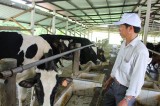Binh Duong animal husbandry gradually repel banned substances
Currently, the use of chemicals, banned antibiotics in animal husbandry is at the critical level. This does not only have negative impacts on public health but also harm domestic livestock sector, especially while the pressure of imported foods is growing.
Binh Duong is one province with fast growing livestock sector and many large farms. The use of banned substances in the province is still ongoing at small- and medium-scale farm holders, but declining at large farms.
.jpg)
Competent authorities conducted inspection before slaughter at a slaughterhouse in An Dien commune, Ben Cat town
Strengthening inspection and control
Currently, the province has 440 pig farms with more than 457,000 pigs, including 293 contract farms, 147 private farms. The province has nearly 3,160 small-scaled farms with more than 94,000 animals.
According to Tran Phu Cuong, Head of provincial Animal Husbandry, Veterinary and Fishery Department, the reason for banned substance use in livestock farming is partially the increase of swine prices that have affected many farmers. Besides, the pressure of the traders has made farmers use banned substances to have good-appearance and lean pork that will be bought with higher prices.
Therefore, in 2015, the department intensified inspections at farms and slaughter-houses. . Accordingly, the unit examined 107 pig rearing facilities/ 122 urine samples and 52 food samples taken directly from the farms. As a result, there were 5 facilities using banned Salbutamol, accounting for 5.55% inspected facilities.
Provincial Animal Husbandry, Veterinary and Fishery Department also took swine samples at slaughterhouses in the province. The results showed that slaughtered pigs containing banned substances were still at a high level. After checking 6 slaughterhouses/ 26 urine samples in towns of Tan Uyen, Thuan An and Di An, the percentage of banned-substance-positive samples was 8 samples, accounting for 30.76%; the residual rate of banned substances (Salbutamol) in pig urines exceeded the permitted level from 2.6 to 120 times. Swine with banned substances primarily came from Dong Nai province (about 80%), the remaining were from inside the province and neighboring provinces.
In the first 3 months of 2016, the department also conducted regular inspections at pig farms and slaughterhouses concentrated in the province through "rapid tests " of pig urine, then sending suspected samples to Central veterinary sanitary checking center 2 (HCMC). The results showed that the number of pig farms using banned substances was still high, accounting for 17.39% inspected facilities.
Say no to illegal substances in livestock farming
Mr. Pham Manh Cuong, owner of Linh Cuong farm with 2 pig farms under self-contained cold barn model and a total swine of 6,000, said banned substances use in animal husbandry was only on a small scale. But this information has affected the whole livestock sector and food businesses. If there were both clean and dirty pork on the market, consumers would absolutely suspect the pork origin. This has affected greatly genuine farmers.
Talking about solutions to the use of banned substances in animal husbandry, Tran Phu Cuong said, the task of all levels and sectors in the province was to implement synchronously measures to prevent, handle strictly violations. Provincial Animal Husbandry, Veterinary and Fishery Department will promote propaganda in order for farmers, consumers to be awareness of the harmful effects of banned substances in livestock sector. In addition, the department's hotline will be maintained to received people’s feedbacks on husbandry, animal health and food safety, and encourage people to provide information about violators. Particularly, the department has encouraged farms, animal feed and veterinary drug businesses in the province to commit not using, selling banned substances in animal husbandry. "Say no to illegal substances in livestock farming” is the motto so that the livestock farming sector could develop in a sustainable way and consolidate trust from consumers
Reported by Quynh Nhien – Translated by Ngoc Huynh
 To clear bottlenecks, make good use of FTAs
To clear bottlenecks, make good use of FTAs
 Vietnam balances supply and demand to prepare for Tet shopping season
Vietnam balances supply and demand to prepare for Tet shopping season
 Developing Bac Tan Uyen district into a town in the period 2030-2040
Developing Bac Tan Uyen district into a town in the period 2030-2040
 Accompanying investors for sustainable development
Accompanying investors for sustainable development
 Tan Uyen: Flexible adaptation, stable growth
Tan Uyen: Flexible adaptation, stable growth
 Tax revenue management boosted and modernized
Tax revenue management boosted and modernized
 To build synchronous infrastructure, facilitate new era development
To build synchronous infrastructure, facilitate new era development
 Bau Bang aims to become a center of innovation and industry
Bau Bang aims to become a center of innovation and industry
 Processing and manufacturing industry makes high efforts, gains good growth
Processing and manufacturing industry makes high efforts, gains good growth
 Enterprises assisted to enhance product quality and elevate competitiveness
Enterprises assisted to enhance product quality and elevate competitiveness







